After our correspondents, it was your turn, and over 200 of you wrote in with accounts of your favourite Test. Some were poetic, others not so, and a couple of our winners managed to strike a fine balance between the dramatic and the humourous. After trawling through all the entries, we picked out nine - an eclectic collection of matches that includes both the famed - Barbados 1999 - and the long-forgotten (Dunedin 1980). Those that missed out can console themselves with the fact that even the cricketing titans of this world fluff their lines sometimes.

|
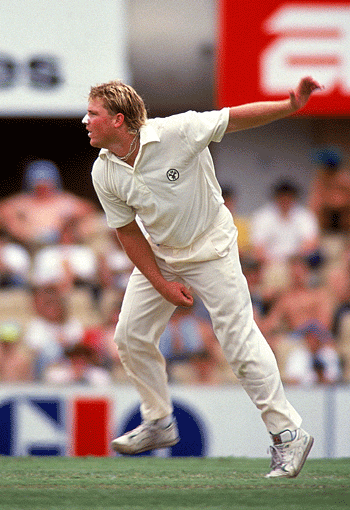
Shane Warne's spell launched him into the cricketing world
© Getty Images
|
|
This match figures as one of the all-time upsets in Test cricket, and Allan Border called it the biggest escape since the Great Train Robbery. What was it like to a Sri Lankan, huddled in a French campsite - without television, TMS, nor internet cafés - to be rudely awakened by Sports Round-up on the BBC World Service to hear the dreaded news: "Australia has beaten Sri Lanka in the first Test in Colombo in one of the most dramatic..."
My two children, five and three at the time, did not know what had hit their father. My groan and grunt, louder than that of Maria Sharapova, woke my camping neighbours, whose concerned queries were answered with "rien, rien". How was I to tell them that Sri Lanka had lost by a mere 16 runs? That was easily translatable to French but I would have had trouble with "lost their last eight wickets for 37 runs". I remember the incident vividly since it is almost 13 years to the day since Sri Lanka suffered one of its biggest humiliations, and launched Warne on the glory path in cricket - he took the last three wickets for 11 runs in 5.1 overs.
Incidentally, Tom Moody, Sri Lanka's present coach was a member of that infamous - to Sri Lankans - Australian team. I only hope he will do us justice and repair the damage by inflicting a bigger loss on his compatriots one of these days.
Omar Nawaz is a Sri Lankan who has been living for over 35 years in France, and is temporarily based in Madrid, working as the coordinator of the Tsunami Task Force Unit at the World Tourism Organisation. A cricket buff, he spends his spare time roaming the Internet for cricket trivia.

|
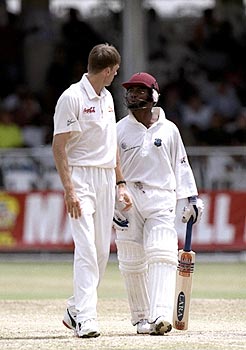
Irresistable force meets immovable object
© Getty Images
|
|
In order to understand fully the greatness of this Bridgetown drama one must first understand the disastrous condition of West Indies Cricket at the time. The boys had just returned from a nasty 5-0 licking in South Africa and just did not seem to be able to put up a challenge against your local primary school under-15s, leave alone mighty Austraila. The Caribbean people wanted Brian Lara's head, but because there really was no one else to take the mantle, the selectors reappointed him captain. The entire team was on "two-Test probation".
The first went as expected as the West Indies were bowled out for a record low of 51, but the genius of Lara emerged in the second Test as his 213 ensured an amazing 10-wicket win in Jamaica. Nothing prepared the cricketing world for the drama to follow.
The third test was one of the greatest battles the cricketing world has ever seen. Amazing performances abounded, with heroic knights fighting for the supremacy of their kingdom. Steve Waugh's brave 199 was ably supported by Ricky Ponting's 104. Then Sherwin Campbell's 105 still left the Windies 161 behind at the end of the first innings.
It was Ambrose and Walsh who gave us a semblance of a chance bowling the Aussies out for 146, leaving an improbable 308 to win. Enter Lara. The man whom everyone wanted out of cricket a few weeks earlier mastered the mighty Shane Warne, a nasty McGrath and an unplayable Gillespie. I remember the drama when he was hit on the head by a nasty McGrath bouncer - the two icons had to be separated by the umpires - and the sound of the next ball as it crashed into the midwicket boundary. When Lara truck the winning four to the cover fence to carry him to 153, he was proclaimed by Tony Cozier as the "Prodigal son turned Messiah". The last 63 runs came with Ambrose and Walsh at the wicket.
Romel Ollivierre is a 23-year-old architecture student from St. Vincent. He consider himself a studious follower of the game and a true, diehard (often heartbroken these days) West Indies supporter.

|
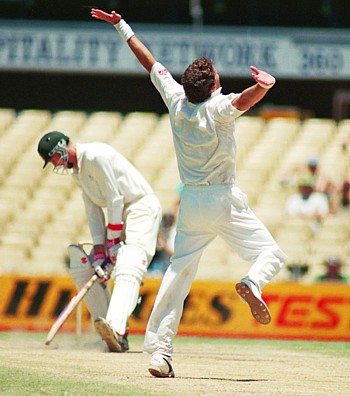
GD McGrath c and b PS De Villiers
© Getty Images
|
|
I had to switch my days and nights around to watch South Africa play Australia - I would sleep during the day and watch the cricket in the early hours of the morning, alone. The first Test was a washout and this game wasn't going our way at all. The South Africans were inexperienced and were totally outplayed for the first 4 days. Shane Warne took 12 wickets in the game and it looked as if he would take one with every ball he bowled to us.
In the end, we set Australia 117 runs to win. On that fourth afternoon, Australia were cruising on 51 for 1. And then Fanie [de Villiers] came back to bowl. He had this irrepressible spirit, and three quick wickets later, Australia closed the day with four down and about 60 runs to get. The odds were still heavily with them. On the fifth morning, Fanie bowled from the start. And this time, Allan Donald joined him, taking three wickets of his own. Australia were wilting under the intensity. They just couldn't score any runs. Damien Martin looked like a hare caught in the headlights, and got out to perhaps the only stroke he played all morning, having faced almost 60 balls for his 6.
Fanie just kept pegging away. At last, he bowled to Glenn McGrath. This was back when McGrath had no illusions about his ability with the bat and a tentative prod from him sent the ball looping gently back to Fanie, who grabbed it with glee. Australia were short by five runs, and it felt as if Fanie's sheer force of will beat them. I woke up my whole family and we celebrated till morning.
Gysbert Engelbrecht is a South African supporter living and working in England. Cricket, to him, is the ulimate game, though his talent lies more in analysing and appreciating, rather than playing it (he tried).

|
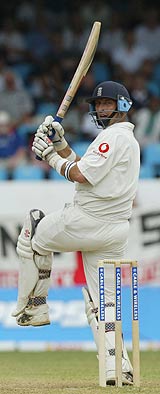
Nasser Hussain: getting at the Aussies
© Getty Images
|
|
Although my favourite match has received some attention during the last few weeks, it would, for all its class, not feature in the lists of most other cricket lovers. It was more of a personal experience for me, which was to have a tremendous significance on my life.
The Test I have in mind is Edgbaston 1997. Coming to England as a 17-year-old German in February to spend five months at a Northumbrian school, I was completely unaware that something like Cricket even existed. I had decided, however, to soak up anything that looked, smelled, or tasted English, prompting me to spend my lunch breaks and a full weekend in front of a television set watching the likes of Atherton, Hussain and Caddick hammer the Aussies. Not that I understood much about cricket then, but the hype and the excitement had already found their way into my head.
Because of my returning to Germany, I wasn't even able to follow the remainder of the series more closely, yet the images of my first Test match will remain in my memory forever. You could wake me at three o'clock in the morning and ask for the innings totals and the final scoreline, and I would give these figures to you on the spot. By the day we won that match (you do notice that I write "we", don't you?), cricket - and England - had gained a most dedicated fan. Imagine a German getting stomach pains from listening to TMS.
Sebastian Altenhoff is a 25-year old university student from a small village right on the River Rhine in the West of Germany. His hobbies include cycling, reading, and playing Cricket Manager, although he dedicates most of his time to training to become a better triple-jumper.
Near-part-timers conquer Lloyd's destroyers
Dylan Cleaver on
Dunedin 1980

|
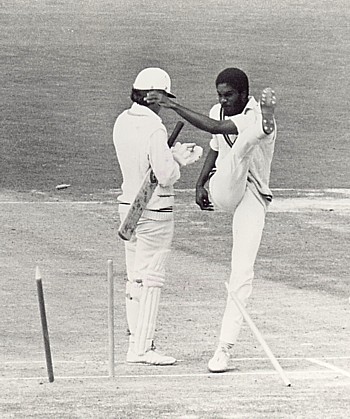
The frustration and disappointment were too much for Michael Holding
© Getty Images
|
|
West Indies and their famed and feared foursome - Andy Roberts, Michael Holding, Joel Garner and Colin Croft - had breezed past Australia 2-0 in a three-match series and probably viewed New Zealand as an unwanted and unworthy addendum to their tour. Indeed, Viv Richards was given dispensation to skip the New Zealand leg of the tour and Roberts missed the first Test. However, New Zealand, led by county pro Geoff Howarth and spearheaded by Richard Hadlee, were in the process of gathering the self-belief to become one of the hardest teams to beat at home during the '80s.
This Test was the spark that ignited that belief. Played at Carisbrook, dreary and cold, the Windies were bundled out for 140 with only a Desmond Haynes half-century saving complete embarrassment. Bruce Edgar played a similar role for New Zealand with Hadlee's hitting at the end providing a 109-run lead. Haynes scored a gritty 300-ball century in the second but when West Indies were again bundled out cheaply, New Zealand needed just 104 to win.
Suddenly, it seemed to dawn on West Indies that they might lose to this bunch of predominantly part-timers, and they bowled with a fury never seen on these shores. Howarth had his helmet knocked off twice and wickets tumbled regularly. Just three fours were scored as New Zealand inched their way to glory. Lance Cairns top-scored with 19, though he was bowled without the bail dropping much earlier, but was the ninth man dismissed with four needed. Gary Troup and Stephen Boock, one of the world's great bunnies, eked out three singles before Boock's front pad provided the most cherished leg bye - via a missed run-out opportunity - in New Zealand cricket history.
Dylan Cleaver is a long-time cricket tragic who is lucky enough to found himself in a job covering the sport. He watched his first Test in 1978, covered his first game in 1996 and has been doing so, aside from a stint working in Ireland, since.

|
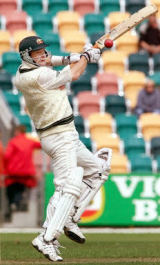
Mark Waugh: one of the greatest fourth-innings centuries of all time
© Getty Images
|
|
As far as see-sawing action goes, few Test matches can compare to the thriller at Port Elizabeth in 1997. On what was an extremely green pitch, South Africa struggled to 209 in their first effort, with Australia apparently on top. The next day, the Aussies crumbled to 108, and the South Africans proceeded to march to a 184-run advantage, with all second-innings wickets intact. Mark Taylor - himself in the middle of a horrific run of form - and his men were staring down the barrel, but incredibly, they staged a valiant recovery, leaving themselves a target of 270.
Few gave them a chance, but nobody told Mark Waugh. He produced a classic of elegance and poise - 116 of the finest on a minefield against the might of an Allan Donald-led pace attack, in a match where there was only one other half-century. When Healy slogged Cronje over square leg, they had closed out a two-wicket win, replete with some of the most exciting cricket ever seen in South Africa.
Sriram Vaidhyanathan works in the finance industry in Chicago. He is a fervent fan of Brian Lara, desperate to watch him bat live in a Test match at least once before he retires.

|
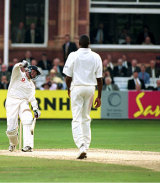
Cork is ecstatic after sealing a series-turning triumph
© Getty Images
|
|
England's recent revival can be traced back to one of the most extraordinary wins ever. They trailed 1-0 to a weak West Indian side coming into the second Test at Lord's and had already pressed the panic button (remember that?) by making four changes, including the recall of Dominic Cork.
The first day, which the West Indies closed on 267 for nine highlighted their batting frailties but no one was prepared for the incredible events of day two. The crowd saw play from all four innings as Caddick knocked over the last man with the first ball of the day. Ambrose and Walsh then put their side's total into perspective by taking four wickets each as England conceded a lead of 133.
If England had gone on to lose the match, and with it probably the series, who knows where they might be now? I'd love to know what was said to Caddick between innings because he produced an unstoppable spell of hostile fast bowling that left West Indies all out for 54.
Remember that this was a team England hadn't beaten since 1970. There was still time for England to start their run-chase, which culminated in Saturday's diabolically nervous crawl to the depths of 160 for eight, from where Cork's penchant for limelight-stealing rescued them.
Thrilling, emotional stuff.
Russell Hope is an England supporter currently in Nottingham watching England's stirring attempt to regain the Ashes.
Greatbatch and 14 hours of adhesion
Michael Thorn on
Perth 1989-90

|
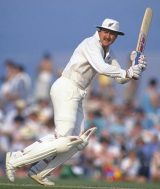
Mark Greatbatch just went on batting as Australia were left panting
© Getty Images
|
|
In November 1989, New Zealand played Australia in a one-off Test at the WACA. New Zealand were without Richard Hadlee and Andrew Jones, and were expected to lose heavily against an Australian team that had been rampant in England. The game started predictably enough when Australia won the toss and ground out 521/9. David Boon scored a double-century and Dean Jones was given out to an appallingly bad lbw decision on 99.
By the time Jones was dismissed, I had lost almost all hope of New Zealand escaping defeat, so to make up for it, brainless teenager that I was, I jeered at my television as Jones walked from the pitch and tried to soak up as much malicious glee as I possibly could from his expression of anguish.
New Zealand started day three with nothing ahead of them except for the distant hope of a draw and the more obvious prospect of a heavy defeat. Terry Alderman bowled Robert Vance almost as soon as play got underway and that brought Mark Greatbatch to the crease. The scorecard tells me that Greatbatch must have spent some of the next three days sitting in the stands and that other people must have batted, but if that's true, I don't remember it. What I can remember is that for 221 minutes in New Zealand's first innings and for 655 minutes in the second, Greatbatch stood firm.
Carl Rackemann was ferocious and had the ball bouncing and screaming from the hard and fast WACA pitch, but each of his rockets was met by a Greatbatch defensive stroke which dropped the ball, quiet and dead, to the ground. Even more strongly, I can remember the faint prospect of a draw looming larger and larger and this causing a fear of that hope being crushed to grow at an exponential rate. There were no flashy strokes and no prospect of a New Zealand victory, just a solid forward-defensive shot that acted like a hypnotist's charm, a buzzsaw of tension and a building realisation that there was a damn sight more to cricket than jeering at Dean Jones.
Michael Thorn is a 30-something writer of dull policy in Wellington, who occasionally escapes the drudgery of work to update a blog on NZ cricket, https://mikeoncricket.blogspot.com/.

|
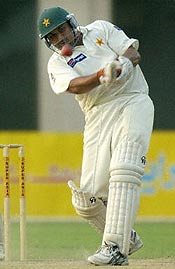
Inzamam-ul-Haq's composed half-century helped Pakistan steal a one-wicket thriller at Karachi in 1994
© Getty Images
|
|
Australia had not won a Test match in Pakistan for more then three decades and were looking to break the jinx with their inexperienced bowling attack led by the two future greats, Glenn McGrath and Shane Warne. The Aussies had the upper hand in the first innings getting an 81-run lead but the real drama started in the second innings.
Australia started disastrously with Mark Taylor, captain for the first time, gone for his second duck of the match. David Boon played a classy and courageous knock to hold the innings together but the two W's, Wasim and Waqar, started an all-too-familiar collapse with the last four wickets adding just 26. Pakistan required 314, and ended the fourth day still requiring 159 with seven wickets in hand.
On the fifth day, Warne weaved his magic, rattling the home team with his vicious leg breaks. Pakistan slumped to 258 for 9 and were staring at defeat, but a brilliant rearguard led by Inzamam-ul-Haq kept them in the hunt. In the end, with three runs still needed, it came down to the battle of three legends - Ian Healy, Warne and Inzamam. Warne's leg break pitched on middle stump, turned a little, touched Inzi's pads and skidded along the ground. Inzamam was out of his crease but Healy missed the stumping much to the joy of home crowd. Pakistan were gifted the winning runs, and Inzamam was the saviour, adding 58 for the last wicket with Mushtaq Ahmed.
So ended one of the great Test matches of all time, one that was never out of reach of either side but never in the firm grasp of one or the other. The Aussies were made to wait another four years to win a Test in Pakistan, and Dickie Bird, the legendary English umpire, termed it the best match in which he stood.
Haris Anis is a 23-year-old computer engineer from Islamabad, and a keen follower of all sports, especially cricket.








